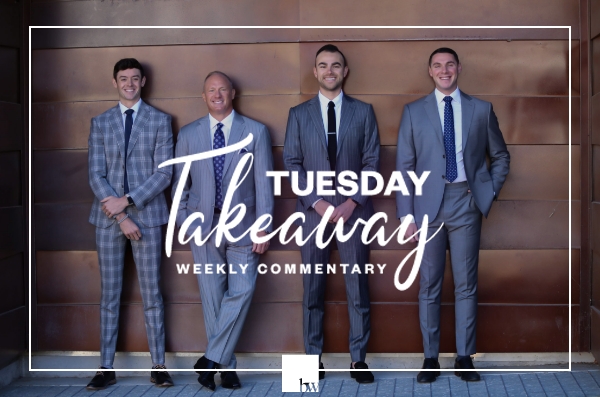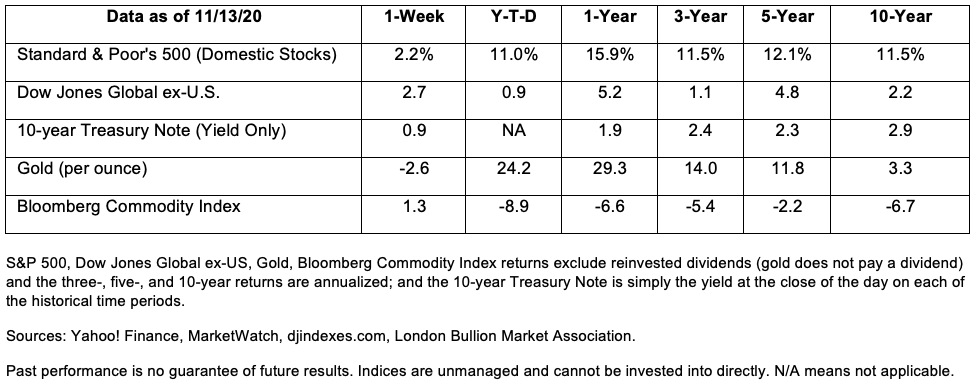
Market Insights:
January 2, 2024
Posted on January 02, 2024
Planning and Guidance, Tailored To Your Life and Goals
Tuesday Takeaway
Posted on November 17, 2020

Vaccine can be a powerful word. It’s worth 14 points in Scrabble (42 on a triple word square) and, last week, it was worth a whole lot more than that to financial markets.
On Monday, a pharmaceutical company and a biotech company announced preliminary trials of their vaccine show it may be 90 percent effective, reported Financial Times. The revelation conjured tantalizing visions of a future in which virus precautions are unnecessary and life returns to normal.
Around the world, pandemic-fatigued populations cheered and markets rallied. CNBC reported:
“The Dow was up nearly 3 percent, while Nasdaq fell 1.5 as laggard sectors like energy and financials outperformed tech. Stay-at-home plays…were sharply lower, but airlines rallied 16 percent. The S&P energy sector, still down 45 percent this year, was up more than 14 percent, and financials were up 8 percent.”
As demand for risk assets, like stocks, increased so did bond yields. In the United States, the yield on 10-year Treasuries rose to 0.97 percent. Rising long-term interest rates caused analysts to speculate about the possibility of inflation and stagflation (rising prices during a period of weak economic growth), reported Barron’s.
Mid-week, enthusiasm moderated. While investors remained confident a vaccine could lead to economic recovery over the longer term, concerns about the shorter-term took center stage. Markets retreated a bit as investors mulled:
Market volatility is likely to persist. Stay calm and don’t let short-term events jar you from your long-term financial goals.


In 1949, Benjamin Graham, who is known as the father of value investing, penned The Intelligent Investor. His book offered insights about how to reduce the risk of loss when investing in stocks.
Graham encouraged investors to understand a stock is more than a ticker symbol. Stockholders are owners of businesses that have underlying value, and that value does not depend on its stock price. He believed investors should purchase shares when a stock is trading below the underlying worth of the business. Value investing is all about looking for bargains, for diamonds in the rough.
Value investing is often discussed in tandem with growth investing.
Growth investors are less concerned about share price and more concerned about above-average earnings growth. They invest in companies that are expected to grow quickly and deliver impressive returns as a result of that growth.
Value investing has had a rough decade. Despite a long history of outperformance – from 1983 through 2019, the FTSE Russell 1000 Value Index outperformed the Russell 1000 Growth Index – value has underperformed since the 2008 financial crisis.
Last week, there was a move from growth-oriented stocks into value-oriented stocks. The Economist explained, “In the past week or so, fortunes have reversed. Technology stocks have sold off. Value stocks have rallied, as prospects for a coronavirus vaccine raise hopes of a quick return to a normal economy. This might be the start of a long-heralded rotation from overpriced tech to far cheaper cyclicals – stocks that do well in a strong economy. Perhaps value is back.”
Time will tell.

Etsy, the online marketplace for all things handmade, has grown like crazy in 2020. Marketplace Plus reports much of the growth is due to folks selling masks during the pandemic.
In Q2, Etsy reportedly sold $346 million in face masks, and in Q3, they sold $264 million, which is 11% of the $2.6B in gross merchandise for the quarter.
That’s because Etsy sent a note to all sellers on April 3 telling their sellers to start offering masks when the White House advised mask-wearing when leaving home. And the sellers did!
Of course, folks who were searching for and buying masks also bought other products once on Etsy. The online merchandiser is expecting a 2020 gross merchandise value of between $8.5B and $9B, an increase from 2019 of 80-90%. And investors are noticing: $ETSY is up four times since its March low and is now valued at ~$16B.
You can read Marketplace Pulse’s entire article here.
